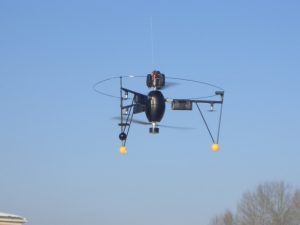Charlotte Personal Injury Attorney Matt Arnold answers the question: “What can you sue for in a personal injury case?”
In 1942 a North Carolina chicken farmer sued the U.S. government. He said air traffic from the nearby military runway was scaring his birds and ruining his livelihood. In 1946, the case had made it all the way to the Supreme Court of the United States.
 The Court’s ruling set out a finite rule as to the limits of private airspace: A homeowner’s property rights extend 83 feet up into the air.
The Court’s ruling set out a finite rule as to the limits of private airspace: A homeowner’s property rights extend 83 feet up into the air.
This 70-year-old ruling is hardly relevant to most passenger aircraft today; the Federal Aviation Administration has long since required planes to fly much higher than 83 feet. Take-off and landing require their own buffer zones. So why is anyone talking about this case now?
Simply put, because we are living in the age of drone technology. The chicken farmer’s case (United States v. Causby) remains the only clear statement of law from the federal government regarding how far into the air your property rights extend. Drones are beginning to play a role in everything from law enforcement to weather monitoring.
As in the chicken farmer’s case, the legal concerns for property owners today definitely include noise pollution and interference with the right to enjoy one’s property (yes, you can sue for each of these). However, the burgeoning industry of commercial drones also has privacy advocates doubly worried.
Last year, a man blasted a drone out of the air above his Kentucky home with a shotgun. A man in New Jersey did the same thing the year before. A Seattle woman called the police on a drone outside her apartment, only to be told it was owned by a company conducting an architectural survey.
Criminal defense advocates are likewise nervous about drone privacy implications as they relate to a person’s right to be free from unreasonable search and seizure.
Existing nuisance and invasion of privacy laws should in theory apply to the drones, but obtaining proof of actual intrusion can be difficult. Complicating this is the fact that everyone defines harassment differently.
And then there are the more concrete examples of drone injury. One woman was clocked in the head with a drone traveling 20 to 30 miles per hour while she visited Miami Beach this September. Others have reported moving vehicles being struck by commercial drones.
However, drone developments aren’t all bad news for the everyday private citizen who wants to enjoy their right to privacy free of Jetson-esque technology. Commercial drone companies are now marketing themselves towards personal injury attorneys so that the devices can aid in accident reconstruction and investigation.
The aerial images drones are capable of obtaining with ease are of far better quality that those offered via Google Maps or other available technology. Information obtained via drone could prove invaluable when it comes to filling in the holes left by accident reconstruction, a dubious science at best, in motor vehicle accident lawsuits and other personal injury incidents.
Whether drone technology will end up helping personal injury lawsuits more than it causes them, remains to be seen.
If you or someone close to you has been injured, contact an experienced personal injury attorney today who can help you receive the compensation to which you may be entitled. Contact Arnold & Smith, PLLC for a free consultation, call at 704-370-2828 or click here for additional resources.
About the Author
 Matthew Arnold is a Managing Member of Arnold & Smith, PLLC, where he focuses on the areas of family law, divorce, child custody, child support, alimony and equitable distribution.
Matthew Arnold is a Managing Member of Arnold & Smith, PLLC, where he focuses on the areas of family law, divorce, child custody, child support, alimony and equitable distribution.
Mr. Arnold was raised in Charlotte, where he graduated from Providence Senior High School. He attended Belmont Abbey College, where he graduated cum laude, before attending law school at the University of North Carolina at Chapel Hill on a full academic scholarship.
A board-certified specialist in the practice of Family Law, Mr. Arnold is admitted to practice in all state courts in North Carolina, in the United States Federal Court for the Western District of North Carolina, in the North Carolina Court of Appeals and Supreme Court, and in the Fourth Circuit United States Court of Appeals in Richmond, Virginia.
In his free time, Mr. Arnold enjoys golfing and spending time with his wife and three children.
http://www.consumerreports.org/electronics/drone-privacy-is-anyone-in-charge/
http://www.nbcmiami.com/news/local/Woman-Hit-on-the-Head-With-Drone-on-Miami-Beach-394689661.html
Image Credit:
https://commons.wikimedia.org/wiki/Category:EMT_Fancopter#/media/File:FanCopter_1024x768.jpg
See Our Related Video from our YouTube channel:
https://www.youtube.com/user/ArnoldSmithPLLC/videos
See Our Related Blog Posts:
 Charlotte Injury Lawyers Blog
Charlotte Injury Lawyers Blog

